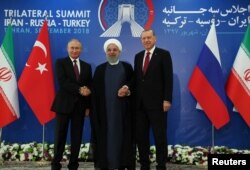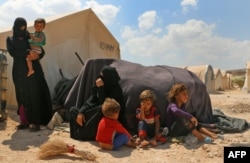A Syrian government offensive in the country's northern region of Idlib would cause humanitarian and security risks for Turkey, Europe and beyond, Turkish President Recep Tayyip Erdogan said Tuesday in an article in the Wall Street Journal.
Last week, Russian and Syrian warplanes resumed their bombing campaign in Idlib, the last rebel enclave in Syria, after weeks of quiet, in an apparent prelude to a full-scale offensive.
Erdogan failed to secure a pledge for a cease-fire from Russia and Iran, Syrian President Bashar al-Assad's main backers, at a trilateral summit in Tehran.
In the newspaper article, Erdogan called on the international community to take action, and warned that "the entire world stands to pay the price" otherwise.
"All members of the international community must understand their responsibilities as the assault on Idlib looms. The consequences of inaction are immense," Erdogan said.
"A regime assault would also create serious humanitarian and security risks for Turkey, the rest of Europe and beyond."
Idlib is the insurgents' only remaining major stronghold and a government offensive could be the war's last decisive battle.
Tehran and Moscow have helped Assad turn the course of the war against an array of opponents ranging from Western-backed rebels to Islamist militants. Turkey is a leading opposition supporter, which has troops in the country and has erected 12 observation posts around Idlib.
At the summit in Tehran, Erdogan, Russia's Vladimir Putin and Iran's Hassan Rouhani agreed in a statement that there could be no military solution to the conflict and it could only end through a negotiated political process.
Erdogan had also called for a truce, but Putin said this would be pointless as it would not involve the Islamist militant groups that Russia deems terrorists, and Rouhani said Syria must regain control over all its territory.
On Tuesday, Erdogan said Russia and Iran were also responsible for stopping a humanitarian disaster in Idlib, and said the international community had to "throw its weight behind a political solution."
Earlier, Turkish Defense Minister Hulusi Akar was reported as saying air and ground attacks on Idlib must stop immediately and a cease-fire must be established in the area.
Chemical weapons
In recent days, U.S. officials have said that they have evidence that Syrian government forces are preparing chemical weapons ahead of a planned assault on Idlib.
On Monday, U.S. President Donald Trump's national security adviser said the United States, Britain and France had agreed that another use of chemical weapons by the Syrian government would result in a "much stronger response" compared to previous airstrikes.
Erdogan said that a focus on the potential use of chemical weapons alone was not enough.
"It is crucial for the U.S., which has concentrated on chemical attacks, to reject its arbitrary hierarchy of death. Conventional weapons are responsible for far more deaths," he said.
Migration surge
Both Turkey and the United Nations have previously warned of a massacre and humanitarian catastrophe involving tens of thousands of civilians in the event of a full-scale offensive.
The U.N. Office for the Coordination of Humanitarian Affairs said on Monday that more than 30,000 people had so far fled their homes in northwest Syria since the resumption of bombardments in the area, and warned that an operation into Idlib could set 800,000 people to flight.
Turkey, which currently hosts some 3.5 million refugees, has also said that it could not accommodate any more migrants if an attack on Idlib caused a new surge of refugees towards it border.











